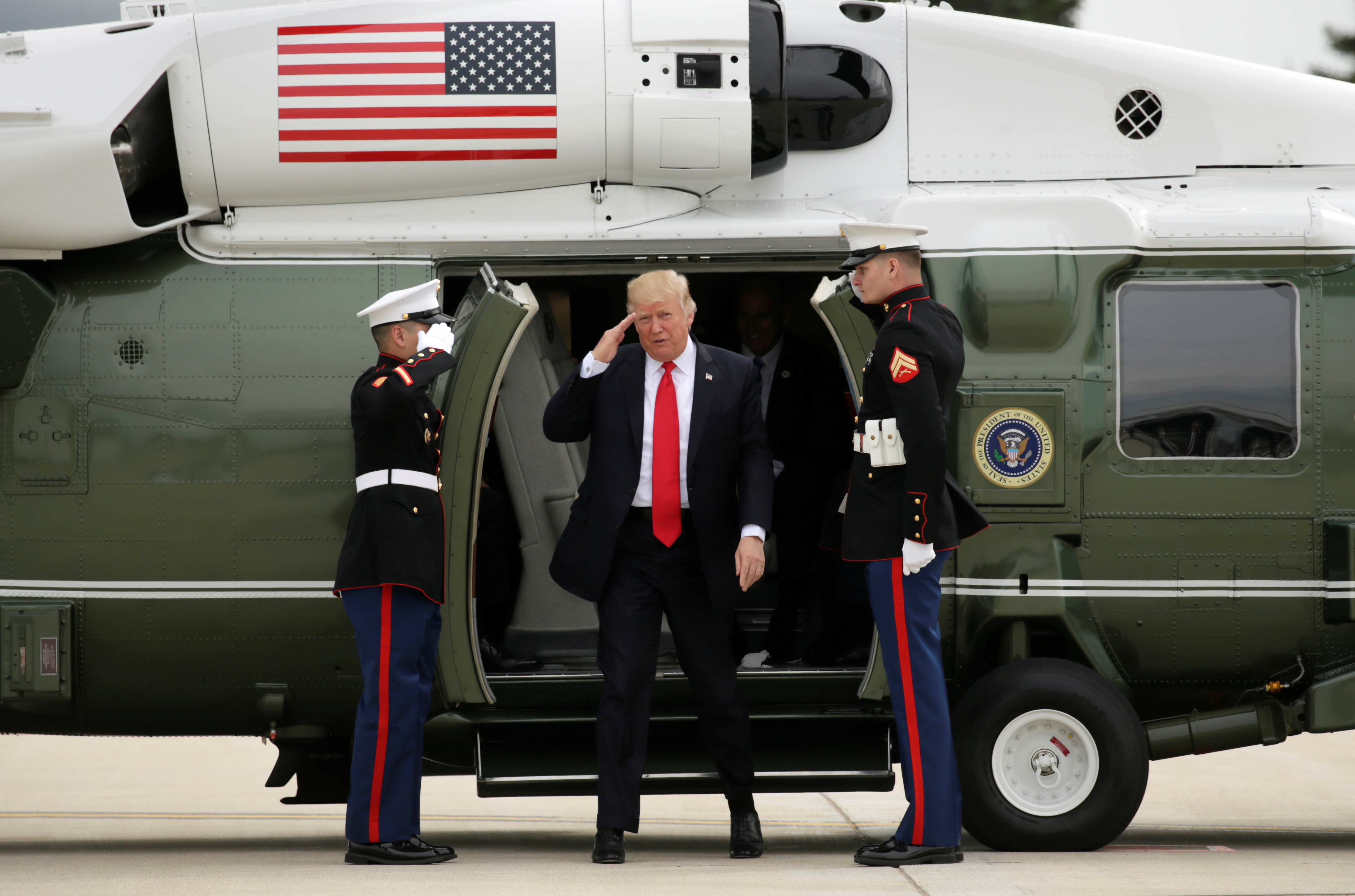Trump's presidency is sputtering. But conservative populism can still thrive.
Don't let Trump wreck it for you


A free daily email with the biggest news stories of the day – and the best features from TheWeek.com
You are now subscribed
Your newsletter sign-up was successful
Donald Trump's presidency is going nowhere, slowly.
TrumpCare died. Tax reform is "doomed." The president's infrastructure plan has stalled. His travel ban remains in legal limbo. Taken together, these failures and delays have the White House feeling like it's already in need of a turnaround operation as the 100-day milepost (arbitrary and media-driven, but nonetheless important to our cable-news-addicted president) approaches. Quite apart from his setbacks on Capitol Hill and the federal bench, Trump has personally undergone a stunning series of reversals on everything from military intervention in Syria to NAFTA to NATO to Chinese currency machinations to the Export-Import bank.
And while Trump is floundering and flip-flopping, Trumpism is mutating. Gone is the scorched-earth populism of his campaign, as witnessed by the marginalization of adviser Stephen Bannon and the rise of his-and-hers "moderates" Jared Kushner and Ivanka Trump. As The New Republic's Brian Beutler rightly points out, Trump is not being yanked by reality toward "centrism," as various D.C. pundits fondly wish; rather, he is gradually being co-opted by a Republican mainstream that is pro-big-business and hawkish on foreign policy.
The Week
Escape your echo chamber. Get the facts behind the news, plus analysis from multiple perspectives.

Sign up for The Week's Free Newsletters
From our morning news briefing to a weekly Good News Newsletter, get the best of The Week delivered directly to your inbox.
From our morning news briefing to a weekly Good News Newsletter, get the best of The Week delivered directly to your inbox.
That's bad for him. It's also bad for the Republican Party and for the country.
For all his innumerable vices, candidate Trump possessed one important virtue: Of the 17 candidates who ran for the Republican nomination, he alone — by intuition more than rational analysis, it scarcely needs to be said — realized that orthodox movement conservatism was a dead horse.
Layered at the top of the Republican coalition is a thin tissue of rich and disproportionately influential donors who favor tax cuts for themselves as well as large corporations and are concerned about entitlements and long-term debt. Trump instinctively identified with the restive plurality of Republican voters underneath: the audience for birtherism, Alex Jones conspiracies, immigrant-bashing, and Islamophobia. Add them to transaction-minded evangelicals and other Republicans who would vote for a yellow dog over a Democrat, peel off a marginal but sufficient number of disaffected Democrats in battleground states, and you have yourself an underwhelming, if still shocking, Electoral College majority.
Mitt Romney beat the dead horse in 2012 and lost badly. Trump walked away from the corpse and won. But now that his administration is, for now, on life support, does that mean the populist alternative to that conservative orthodoxy was stillborn?
A free daily email with the biggest news stories of the day – and the best features from TheWeek.com
Hardly. There is a strong case for populist conservatism.
Let's distinguish between Trumpist populist-nationalism and populism, broadly speaking. The Trumpist version is defined by four features:
1. The otherization and scapegoating of racial and religious minorities.
2. An embrace of Peronist authoritarianism, that is, a personality cult centered on a charismatic demagogue.
3. A related authoritarian impulse that extends to local police forces viewed in conflict with minorities run violently amok or ensconced in "sanctuary cities."
4. An inchoate sense that the post-industrial economy, by freely moving human and financial capital, has left ordinary Americans behind.
You'll probably notice that I left the vaguest feature for last. That's because one could subtract the first three and still be left with benign populism. As the political scientists Wendy Rahn and Eric Oliver have argued, "authoritarians and populists can overlap and share dark tendencies toward nativism, racism, and conspiracism. But they do have profoundly different perceptions of authority. Populists see themselves in opposition to elites of all kinds. Authoritarians see themselves as aligned with those in charge."
In short, it's possible to be a populist without resorting to the ugly aspects of Trumpism.
Critically, Rahn and Oliver argue that true populism is as distinct from Trump as it is from Bernie Sanders: "Despite the fact that Sanders often gets called a populist, his voters do not conform to the populist stereotype. They generally trust experts and do not identify strongly as Americans. A better way to describe them would be cosmopolitan socialists. They see the system as corrupted by economic elites. But they don't trust ordinary Americans and show only light attachment to Americanism as an identity."
The choice between movement orthodoxy and Trump is, thankfully, false. It just so happens that a group of elite-mistrusting conservative wonks has crafted a policy agenda to update conservatism for this new populist era. You may have heard of them: the "reformicons." Could such a reform-minded conservatism command national attention and bridge the policy divisions within the Republican Party? I have no idea. The point for now is this: No one — certainly not Donald Trump — has even tried.
Scott Galupo is a freelance writer living in Virginia. In addition to The Week, he blogs for U.S. News and reviews live music for The Washington Post. He was formerly a senior contributor to the American Conservative and staff writer for The Washington Times. He was also an aide to Rep. John Boehner. He lives with his wife and two children and writes about politics to support his guitar habit.
-
 The ‘ravenous’ demand for Cornish minerals
The ‘ravenous’ demand for Cornish mineralsUnder the Radar Growing need for critical minerals to power tech has intensified ‘appetite’ for lithium, which could be a ‘huge boon’ for local economy
-
 Why are election experts taking Trump’s midterm threats seriously?
Why are election experts taking Trump’s midterm threats seriously?IN THE SPOTLIGHT As the president muses about polling place deployments and a centralized electoral system aimed at one-party control, lawmakers are taking this administration at its word
-
 ‘Restaurateurs have become millionaires’
‘Restaurateurs have become millionaires’Instant Opinion Opinion, comment and editorials of the day
-
 The billionaires’ wealth tax: a catastrophe for California?
The billionaires’ wealth tax: a catastrophe for California?Talking Point Peter Thiel and Larry Page preparing to change state residency
-
 Bari Weiss’ ‘60 Minutes’ scandal is about more than one report
Bari Weiss’ ‘60 Minutes’ scandal is about more than one reportIN THE SPOTLIGHT By blocking an approved segment on a controversial prison holding US deportees in El Salvador, the editor-in-chief of CBS News has become the main story
-
 Has Zohran Mamdani shown the Democrats how to win again?
Has Zohran Mamdani shown the Democrats how to win again?Today’s Big Question New York City mayoral election touted as victory for left-wing populists but moderate centrist wins elsewhere present more complex path for Democratic Party
-
 Millions turn out for anti-Trump ‘No Kings’ rallies
Millions turn out for anti-Trump ‘No Kings’ ralliesSpeed Read An estimated 7 million people participated, 2 million more than at the first ‘No Kings’ protest in June
-
 Ghislaine Maxwell: angling for a Trump pardon
Ghislaine Maxwell: angling for a Trump pardonTalking Point Convicted sex trafficker's testimony could shed new light on president's links to Jeffrey Epstein
-
 The last words and final moments of 40 presidents
The last words and final moments of 40 presidentsThe Explainer Some are eloquent quotes worthy of the holders of the highest office in the nation, and others... aren't
-
 The JFK files: the truth at last?
The JFK files: the truth at last?In The Spotlight More than 64,000 previously classified documents relating the 1963 assassination of John F. Kennedy have been released by the Trump administration
-
 'Seriously, not literally': how should the world take Donald Trump?
'Seriously, not literally': how should the world take Donald Trump?Today's big question White House rhetoric and reality look likely to become increasingly blurred
